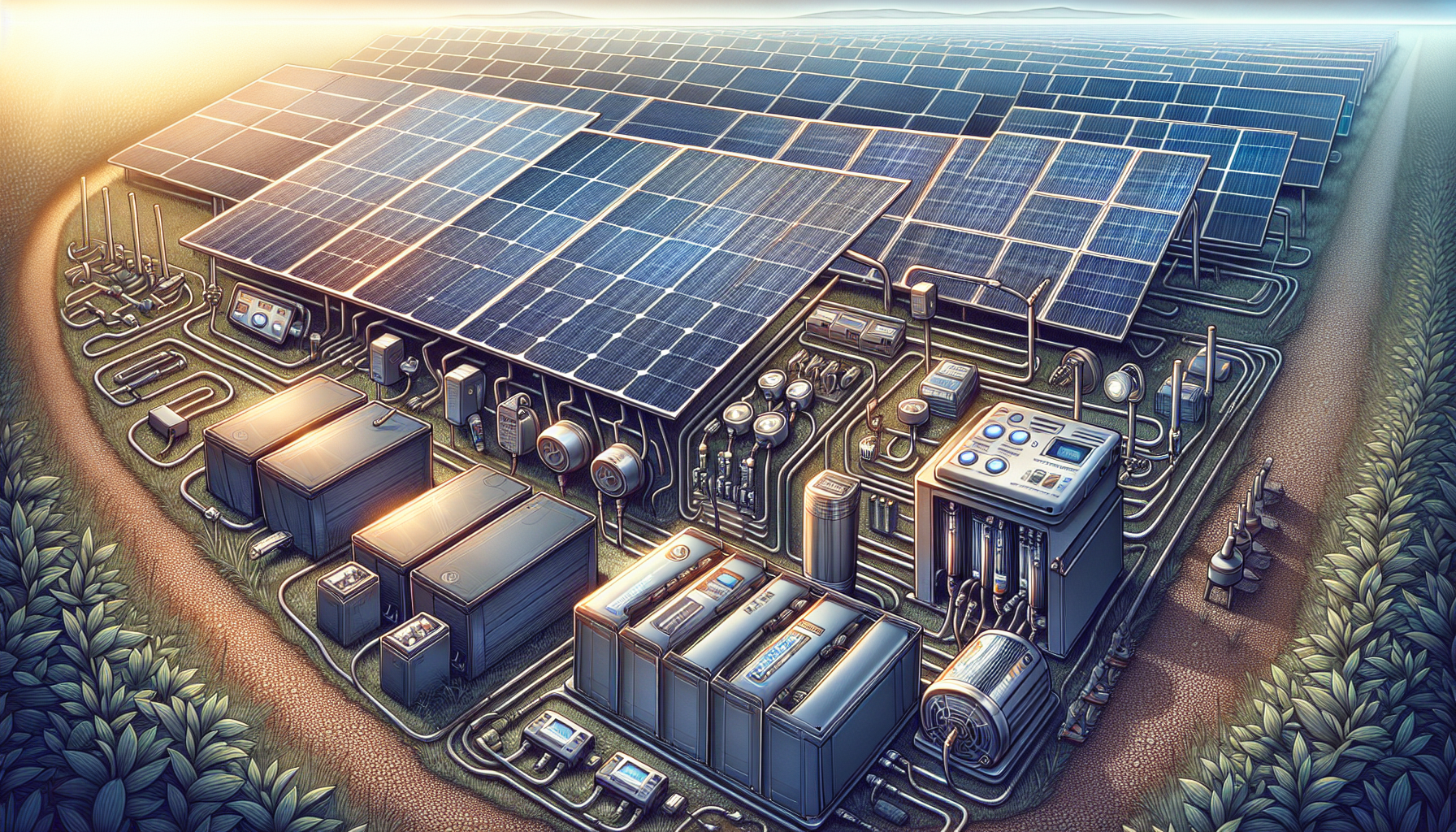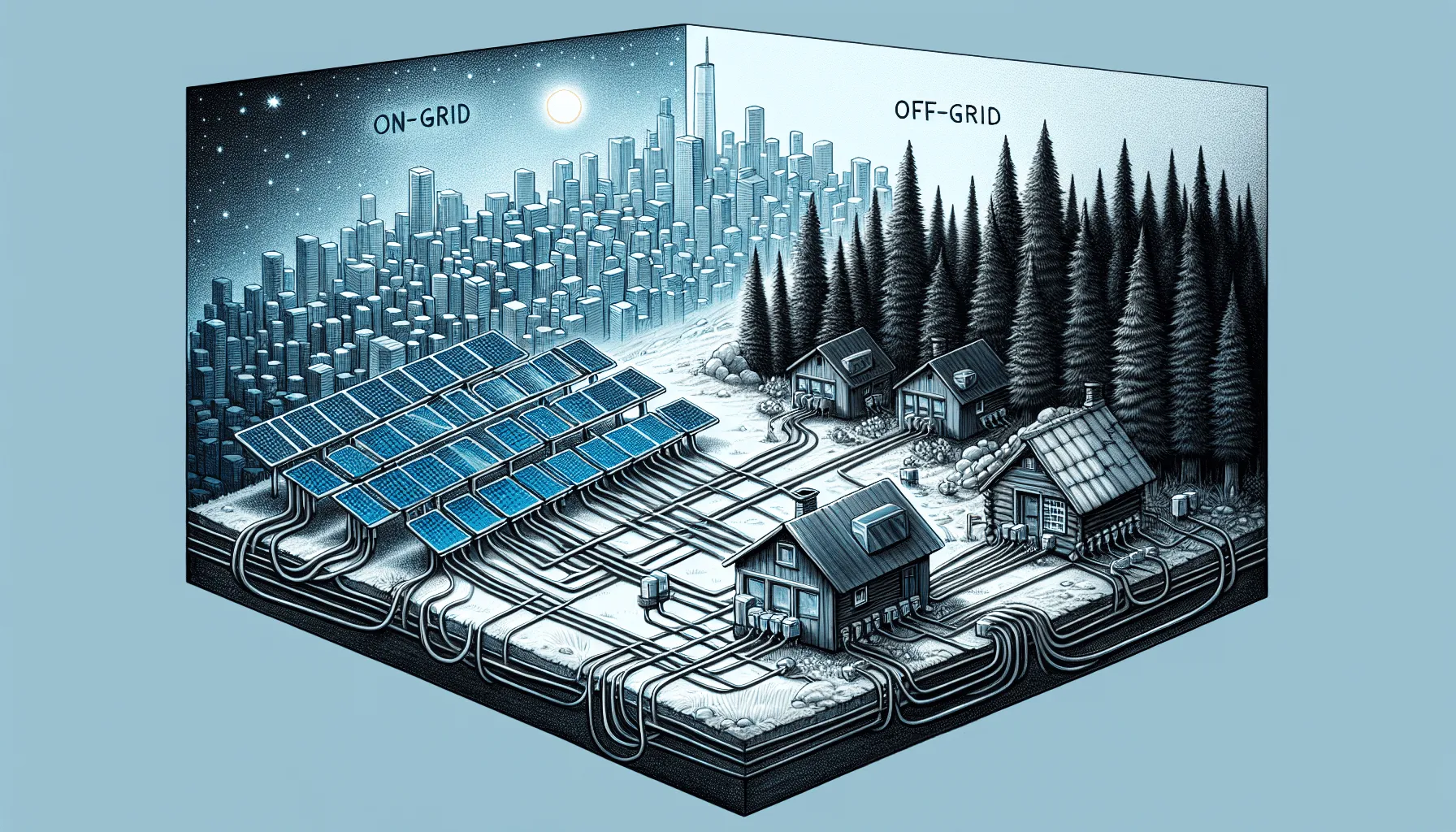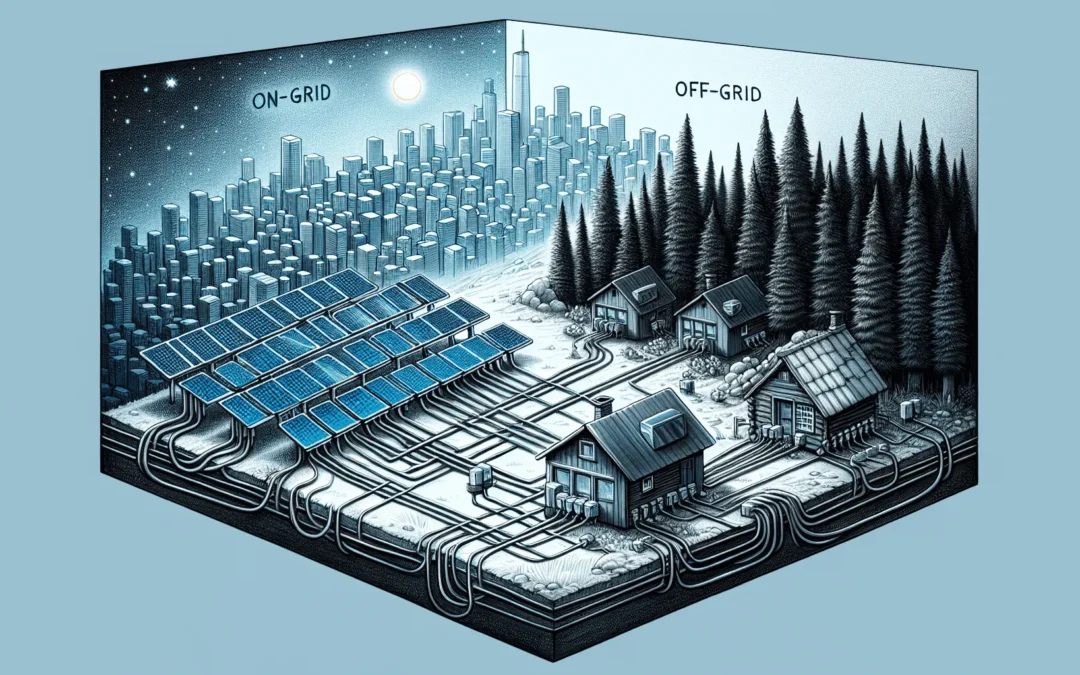Are you considering solar energy and wondering about “off grid vs on grid solar energy”? This article breaks down the key differences between these two solar energy systems, giving you the lowdown to help you decide what’s best for you.
Key Takeaways
- Off-grid solar systems give you total energy freedom, making them perfect for remote areas and for keeping the lights on during power outages.
- On-grid solar systems are budget-friendly and let you save by feeding extra electricity back into the grid.
- Deciding between off-grid and on-grid solar systems comes down to your energy needs, budget, and how much you want to cut ties with the utility grid.
Understanding Off Grid Solar Systems

Off-grid solar systems are self-contained setups that generate and store their own electricity, completely independent from the utility grid. These systems have become more popular lately due to rising energy costs and a growing interest in sustainable living. Off-grid systems, which rely entirely on solar power, provide a unique level of energy independence. This means you can generate and control your electricity without needing to rely on external sources. Cost factors related to an off-grid solar power system include the system’s size, location, and ongoing maintenance.
The main draw of off-grid systems is the energy freedom they offer. For those living in remote areas or wanting to be totally self-sufficient, off-grid solar systems are a reliable powersource. They’re especially useful in places where hooking up to the power grid isn’t practical or during emergencies when the grid goes down.
Key Components of Off Grid Systems
The backbone of any off-grid solar system includes several key components: solar panels, batteries, charge controllers, and inverters. Solar panels, the heart of these systems, soak up sunlight and turn it into electricity. Placing them just right is key to getting the most out of the sun’s energy. An off grid solar kit offers a comprehensive solution tailored for off-grid living, emphasizing features like reduced electricity bills and power outage protection.
Batteries are crucial for storing extra energy generated during the day, so you’ve got power at night or on cloudy days. Charge controllers keep an eye on the electricity flow from the solar panels to the batteries, making sure they get charged properly and safely. Lastly, inverters change the stored DC energy from the batteries into AC energy, which is what most of your household gadgets use. Together, these components create a reliable power system that works independently from the electricity grid.
Benefits of Off Grid Solar Systems
One of the coolest things about off-grid solar systems is the total energy freedom they give you. By generating and storing your own electricity, you can:
- Dodge those annoying fluctuating utility prices
- Cut down on electricity bills
- Live a greener, more sustainable life
- Be totally independent from the power grid
This setup is perfect for anyone wanting to go green and live off the grid.
Off-grid systems are great because they provide:
- Reliable power in remote or rural areas where the grid doesn’t reach
- Self-sufficiency, so power outages won’t mess up your day
- A cost-effective and practical solution for those living in off-grid cabins or remote spots.
Exploring On Grid Solar Systems

On-grid solar systems, also known as grid-tied, come with some pretty cool features:
- They stay connected to the utility grid
- They share any extra electricity you generate with the grid
- They pull power from the grid when you need it
- They’re budget-friendly and easy to set up with your existing infrastructure, making them a popular choice for many homeowners.
The big draw of on-grid systems is their ability to use the utility grid as a backup, ensuring you always have electricity. This connection lets you take advantage of net metering, where you earn credits for any extra energy you send back to the grid, cutting down on your overall energy costs.
How On Grid Systems Work
On-grid solar systems work by converting sunlight into electricity with solar panels. During the day, these panels generate electricity to power your home. Any extra energy that isn’t used right away gets sent back to the grid, often scoring you credits through net metering.
Net metering is a big perk of on-grid systems, as it helps you cut down on energy costs. When your solar panels produce more electricity than you need, the surplus goes to the grid, and you earn credits. On the flip side, when the panels aren’t cranking out enough power, like at night or on cloudy days, the system pulls electricity from the grid.
Advantages of On Grid Solar Systems
One of the biggest perks of on-grid solar systems is their affordability. Since they don’t need a bunch of batteries or charge controllers, the initial cost is way lower compared to off-grid systems. This makes them a great choice if you’re looking to go solar without breaking the bank.
Plus, on-grid systems are super reliable because they can tap into the utility grid when your solar panels aren’t producing enough power. This means you’ll always have electricity, even on cloudy days or at night, without having to invest in pricey battery storage. And don’t forget the savings from net metering, which can really make your wallet happy.
Comparing Costs: Off Grid vs On Grid Solar Systems
When you’re comparing the costs of off-grid and on-grid solar systems, it’s important to think about both the initial investment and the long-term savings. Off-grid systems typically need a bigger upfront investment because you have to buy batteries and charge controllers.
On the other hand, on-grid systems are cheaper to start with and can save you a lot over time through net metering and lower energy bills. Getting a handle on these cost differences will help you make the best decision.
Initial Investment
Off-grid solar systems require a bigger upfront investment. This includes the cost of:
- Solar panels
- Inverters
- Batteries
- Charge controllers
The number of solar panels needed is influenced by system size, sunlight availability, and peak sun hours, which impacts the overall expenses.
Batteries and charge controllers can be pretty pricey, adding to the overall cost.
On the flip side, on-grid systems generally have lower initial costs since they don’t need battery storage. For those watching their budget, on-grid systems are a more wallet-friendly way to get into solar energy.
Long-Term Savings
While off-grid systems get rid of those pesky monthly electricity bills, you’ll need to replace the batteries every so often as they wear out. So, the long-term savings are there, but you’ll have some ongoing maintenance costs to think about.
On the other hand, on-grid systems can save you more in the long run thanks to net metering. This means you can earn credits for any extra energy you send back to the grid, which helps lower your overall electricity costs. Plus, there are various solar incentives and federal tax credits that can boost your return on investment for on-grid systems.

Figuring out your energy needs and how much power you use is key when deciding between off-grid and on-grid solar systems. Different habits and usage patterns can help you choose the best fit for your lifestyle.
Knowing your average daily energy use, peak energy times, and overall needs will guide you in picking the right system and making sure it’s the right size.
Calculating Your Energy Needs
To figure out your daily energy usage, follow these simple steps:
- Make a list of all your electrical gadgets and how long you use them each day.
- Find the wattage ratings on each gadget (usually found on a label or in the manual).
- Multiply the wattage by the number of hours you use each gadget daily.
- Add up all these numbers to get your total daily energy consumption.
For example, if you have a 50-watt fan running for three hours a day, it uses 150 watt-hours daily. By adding up the energy usage of all your gadgets, you’ll get a clear picture of your total daily energy needs.
Matching System Capacity to Consumption
Matching the capacity of your solar panels with your energy needs means thinking about both your average and peak energy use. Solar panels mainly generate power during the day, with the most output happening around midday.
You’ll want to make sure your solar system can handle your energy needs all year round, taking into account seasonal changes and any appliances that use a lot of power, like air conditioners. It’s also important to figure out the size and efficiency of the solar panels you need based on where you live and how much sunlight you get.
Environmental Impact

Switching to solar energy is a great way to cut down on your environmental impact. Whether you go off-grid or stay connected to the grid, both systems help reduce greenhouse gas emissions and promote a more sustainable lifestyle.
Using solar energy means you’re relying less on fossil fuels, which is awesome for shrinking your carbon footprint. Plus, you’re tapping into a renewable energy source that’s better for the planet.
Reducing Carbon Footprint
Off-grid solar systems are great for shrinking your carbon footprint since they cut down on the need for fossil fuel-generated electricity. By making and storing their own power, these systems help reduce greenhouse gas emissions.
On-grid systems also play a role in lowering carbon footprints, even though they sometimes pull energy from the grid, which might include fossil fuels. However, when you look at the big picture, solar systems have much lower carbon dioxide emissions per kWh compared to traditional power plants.
Sustainable Energy Practices
Solar energy is all about sustainable living by tapping into an endless and renewable source—the sun. Unlike fossil fuels that are running out, solar energy helps keep our planet greener.
Cool tech like solar thermal systems and concentrating solar power (CSP) plants boost sustainable energy practices by providing low-carbon energy. Plus, solar panels use photovoltaic cells to generate electricity without needing water, unlike some other power methods.
Practical Considerations
Practical considerations like where you live, how much sunlight you get, maintenance needs, and reliability are super important when picking a solar system. These factors can really impact how well your solar setup works.
Off-grid systems, also known as off grid system, give you total energy freedom, making them perfect for remote spots without access to the utility grid. Conversely, on-grid systems rely on the grid for backup power and to send any extra energy back.
Location and Sunlight Availability
Where you live and the weather make a big difference in how efficient your solar panels are. Places closer to the equator get more sunlight, which means more solar energy for you.
Things like latitude, cloud cover, and seasons also play a role in how well your solar panels perform. It’s important to think about these when setting up your solar energy system to get the best results.
Maintenance and Reliability
Both off-grid and on-grid systems need regular check-ups and cleaning to keep them running smoothly. Keeping your solar panels clean and checking the system components is key to maintaining efficiency.
The reliability of your grid connection is something to think about too. If you have frequent power outages, an off-grid system might be more appealing for a steady power supply. No matter which system you choose, regular maintenance is crucial for long-term reliability and having a dependable power source.
Making the Right Choice
Choosing between off-grid and on-grid solar systems is all about figuring out your energy needs, budget, and how much you want to rely on the utility grid. Off-grid systems give you total energy freedom, while on-grid systems offer backup support and cost savings.
Taking the time to plan and do your research is key to making the best choice for your situation. Talking to professionals, your friends here at Artisan Electric, can give you valuable insights and help you find the most reliable and cost-effective system for your needs.
Artisan Electric is all about quality and customer service, making sure you get the best solar energy solution for your home. With their help, you can smoothly switch to solar energy and enjoy all its perks.
Summary
Deciding between off-grid and on-grid solar systems comes down to your energy needs, budget, and environmental goals. Off-grid systems are perfect for complete energy independence and remote areas, while on-grid systems provide cost-effective solutions with the backup of the utility grid.
By getting to know the key components, costs, energy requirements, and environmental impacts of each system, you can make a smart choice that fits your lifestyle. Embrace solar energy and take a step towards a greener future.
Frequently Asked Questions
Is it worth it to go off-grid with solar?
It really depends on your energy needs and budget. If your home uses a lot of electricity and solar panels are pricey to install, going off-grid might not be worth it.
What are the main parts of an off-grid solar system?
An off-grid solar system mainly includes solar panels, batteries, charge controllers, and inverters. These parts work together to generate and store energy so you can use it without relying on the grid.
How does net metering work in on-grid solar systems?
Net metering lets you earn credits for any extra electricity your solar panels produce and send back to the grid, which helps lower your energy costs.
What are the long-term savings benefits of on-grid solar systems?
On-grid solar systems can save you a lot in the long run through net metering, lower electricity bills, and various solar incentives or federal tax credits.
How do I figure out my daily energy needs for a solar system?
To calculate your daily energy needs, list all your electrical appliances, note their wattage, and multiply that by the hours you use them each day. This will give you the total energy required, helping you determine the right solar system size for your needs.

